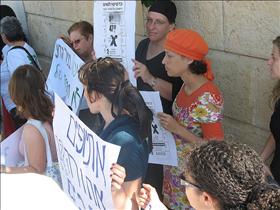Women Have Right To Choose Bus Seat
The Hiddush organization for religious freedom and equality expressed similar sentiments to the Masorti movement, saying in a statement that "the Supreme Court's decision means that sexual harassment of women in the mehadrin lines will continue."
06/01/2011 19:12
Tags: segregation · buses

Religious and secular activists from women's organizations demonstrate against the segregation lines. 2009
The Hiddush organization for religious freedom and equality expressed similar sentiments to the Masorti movement, saying in a statement that "the Supreme Court's decision means that sexual harassment of women in the mehadrin lines will continue."
According to Hiddush's Director-General Rabbi Uri Regev, "Despite the good intentions of the court, a solution based on voluntary choice is not realistic. Experience shows that radical haredim will not accept this."
The Masorti (conservative) Movement on Thursday criticized the Supreme Court's decision, saying: "The court determined a few important principles in its ruling, but the struggle is sadly not over."
The movement's CEO Yizhar Hess said in a statement: “Once and for all, the deceptive veil must be torn off the prevalent claim in favor of respecting the phenomenon of excluding women from the public sphere, in the name of a religious lifestyle, that chooses to make women invisible to men, lest they should cause those males sinful thoughts.”
“The mehadrin lines were conceived in sin. It is important to remember that the 'separate but equal' equation is usually refuted, since the side that pays the price is the weak one. Not only women are excluded in the mehadrin lines,” the statement said. “It is human dignity that diminishes.”
Read entire article on Jerusalem Post